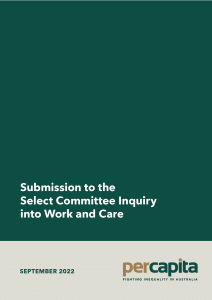 “…. housework is everything. It’s a ubiquitous physical demand that has hamstrung and silenced women for most of human history.”
“…. housework is everything. It’s a ubiquitous physical demand that has hamstrung and silenced women for most of human history.”
Megan K Stack, Women’s Work, 2019
Per Capita welcomes the Senate’s initiative to inquire into the interaction of paid and unpaid work, especially the work of care, and its effects on workers, carers and recipients of care. This is an issue that affects all Australians, and consideration of how we might better balance the demands of paid labour with the needs of our families and loved ones is fundamental to creating a more equitable and just society.
This submission, which is largely drawn from Per Capita’s 2020 report Measure for Measure: Gender Equality in Australia, looks at the impact of unpaid labour and care through a gender lens. It is overwhelmingly women in heterosexual relationships with dependent children who undertake care and other unpaid domestic work in Australia, more so than in most comparable OECD nations.
Globally, women still undertake more than three-quarters of the world’s unpaid care work. The largest discrepancies between women’s and men’s rates of unpaid work are found in developing countries, but still in relatively egalitarian nations like Australia, women continue to shoulder a disproportionate amount of unpaid domestic labour and care, even when they are in the paid labour force.
Women’s share of the paid labour force in Australia has increased from just over a third forty years ago, to almost half today. So, it would be natural to expect that the share of unpaid labour has seen a similar shift towards a more equitable distribution between men and women over the same time.
Unfortunately, this is not so.

